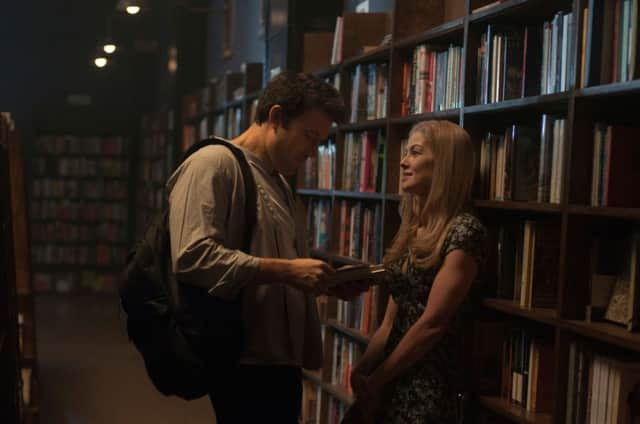Film review: Gone Girl


Gone Girl (15)
Directed by: David Fincher Starring: Rosamund Pike, Ben Affleck, Neil Patrick Harris, Carrie Coon, Tyler Perry
Star Rating: * * * *
Flynn’s dark, twisty, mordantly funny thriller about a husband who becomes the prime suspect in his wife’s disappearance offers such a deliciously depraved prism through which to explore the vicissitudes of modern marriage that it feels of a piece with the discordant worldview Fincher has been disseminating since putting Gwyneth Paltrow’s pretty head in a box in Seven.
Advertisement
Hide AdAs it happens, a pretty head is how he chooses to open Gone Girl. Kicking off with an oddly framed shot of Rosamund Pike’s bonce while Ben Affleck’s voiceover expounds on his desire to crack it open, Fincher sets a suitably playful tone from the off that eases us into the narrative trickery of a story that delights in wrong-footing audiences as a way of enhancing its thematic concerns. This is a film, after all, about the deceptive nature of relationships – and the enjoyably preposterous deceptions perpetrated in the plot merely help mask the more uncomfortable home truths that that Fincher and Flynn (who adapted the book herself for the big screen) seem to be getting at via the conscious uncoupling of Nick and Amy Dunne, Gone Girl’s married, pathologically unhappy protagonists.
Affleck plays the former, a failed writer in recession-hit America whose seemingly passive acceptance of his own unfilled potential is given a jolt when Amy (Pike) disappears on the morning of their fifth wedding anniversary. As the police investigation starts probing into his life, Nick begins to realise the less-than-perfect realities of his marriage, his innate desire to please others, and his inability to look sincere in front of a camera are conspiring to make him seem, if not exactly guilty of a crime, at least suspicious enough to turn the tide of public opinion against him.
Here Fincher turns Gone Girl into a satire of the quick-to-condemn mob mentality of the social media age, with Nick – who lost his New York job as a magazine writer with the onset of the blogosphere – forced into the realisation that he needs to take control of the narrative of his own life. Playful shades of The Social Network thus come into the film, as do the investigative aspects of The Girl With the Dragon Tattoo and Zodiac as Nick launches his own investigation into Amy’s disappearance with the help of his twin sister Margo (a brilliant Carrie Coon).
As fans of Flynn’s source novel will know only too well, though, part of the pleasure of the book is that its meticulously structured mystery is revealed as much by diary entries written by Amy prior to her disappearance as it is by Nick’s first person account of the fall-out from her going missing. The film smartly maintains these conflicting and unreliable perspectives through deceptively simple use of flashbacks. But while Flynn’s adaptation is faithful and mercifully fleet-footed, Fincher ups the air of mistrust further by subtly altering the tone of both the flashbacks and the present day scenes so that it becomes harder to discern whose point-of-view we’re really getting and whose point of view we’re supposed to trust.
This is where the brilliance of the performances has a big impact. Affleck’s turn as Nick capitalises on the easygoing, slightly smug-seeming charm Affleck himself possesses (something that continues to rub people up the wrong way if the furore surrounding his casting last year as the new Batman is anything to go by). For chunks of the film he deliberately makes Nick seem bland, a defence mechanism of sorts for a character unsure of how to present himself as normal. And yet, as the twists come into play, he reveals more depth, transforming Nick into another of Fincher’s masculine-challenged protagonists. Like Ed Norton in Fight Club, Jesse Eisenberg in The Social Network and Daniel Craig in The Girl with the Dragon Tattoo, he’s a man floundering as he tries to reconcile his idea of the world with his actual place in it. Pike’s virtuoso turn as Amy also gradually dismantles the perception we first have of her and, over the course of the film, she exposes the false ideals to which too many couples adhere. Punch and Judy dolls become amusingly droll motifs throughout, although as the guerrilla warfare element of Nick and Amy’s relationship comes more to the fore, the film really excels in depicting marriage as a Frankenstein-like institution, one in which its participants’ attempts to construct their ideal partners has monstrous consequences. The trick of the film, though, is its ability to leave you questioning who the real monster is.